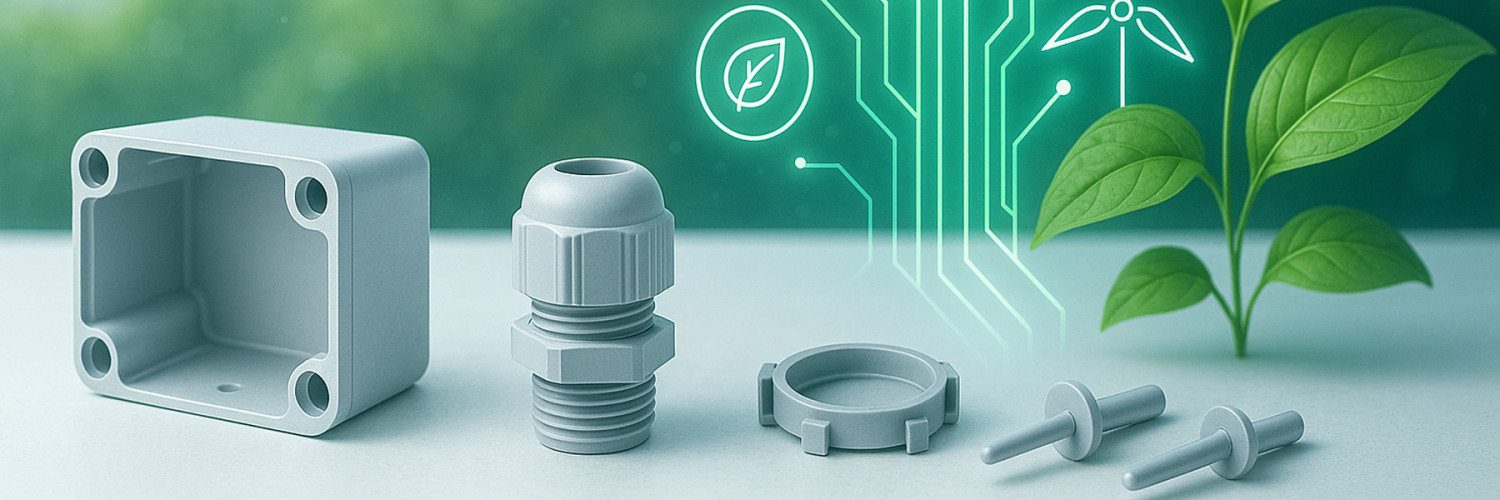Sustainability in Plastic Manufacturing

Introduction
Plastic has long been an essential material in industries ranging from electronics to healthcare. However, global concerns about environmental impact are pushing manufacturers to rethink how plastics are made, used, and recycled. Today, sustainability in plastic manufacturing is no longer optional — it’s a necessity. At Cancer Plastomech, we are embracing this shift by integrating responsible practices into every step of our production process while continuing to deliver reliable, high-performance components.
Why Sustainability Matters in Plastics
Conversations around plastics often focus on waste and pollution. While these are real challenges, the solution lies not in abandoning plastics but in innovating how they are manufactured and managed. For industries like electronics, plastics provide unmatched benefits in insulation, safety, and design flexibility. By adopting eco-friendly practices, manufacturers can continue reaping these benefits while reducing their environmental footprint.
Key Sustainable Practices in Plastic Manufacturing
1. Use of Recyclable Engineering Plastics
Advanced polymers such as polycarbonate (PC) and nylon are recyclable and can be reprocessed for multiple applications. By carefully selecting materials, manufacturers can strike a balance between performance and sustainability.
2. Energy-Efficient Manufacturing
Injection molding machines and tooling facilities now run on optimized energy cycles, significantly reducing power consumption. This not only lowers costs but also minimizes carbon emissions.
3. Waste Minimization
Scrap plastics from mold trimming and production errors can be recycled back into the production line. At Cancer Plastomech, we prioritize reusing in-house scrap to achieve near-zero waste manufacturing.
4. Eco-Friendly Packaging
Sustainable manufacturing doesn’t stop at production. By using recyclable and minimal packaging, we ensure that our logistics chain contributes positively to the environment.
5. Long-Life Components
Durable, high-quality plastic parts reduce the need for frequent replacements. This helps clients minimize waste at their end, contributing to a more sustainable ecosystem.
The Role of Technology in Green Plastics
Technology is driving the future of sustainable plastics. From biodegradable polymers to smart recycling systems, research is pushing boundaries to reduce the environmental impact of plastic use. Additive manufacturing (3D printing) and AI-powered production monitoring are further enhancing efficiency while cutting down waste.
Cancer Plastomech’s Commitment to Sustainability
As a responsible manufacturer, we are committed to making sustainability central to our operations. Our initiatives include:
- Material selection – Using recyclable and high-grade engineering plastics wherever possible.
- Energy optimization – Operating energy-efficient machines with minimal idle cycles.
- Recycling systems – Reintroducing scrap plastics into the production stream.
- Lean manufacturing – Reducing material waste through efficient processes.
- Client education – Helping clients choose sustainable options for their applications.
Future Outlook
The future of plastic manufacturing lies in combining performance with sustainability. As industries adopt greener practices and governments introduce stricter environmental regulations, companies that invest in sustainable solutions will lead the way. At Cancer Plastomech, we believe in partnering with clients to deliver products that not only meet their technical needs but also align with global sustainability goals.
Conclusion
Sustainability in plastic manufacturing is about more than recycling — it’s about responsibility, innovation, and long-term thinking. By integrating eco-friendly practices, manufacturers can reduce their impact on the environment while continuing to deliver value to industries worldwide. Cancer Plastomech is proud to be part of this transformation, offering high-performance plastic components that are reliable, durable, and future-ready.
